Each group is different so the right program is uniquely designed and delivered to the needs of your people, your organisation and all other aspects required to maintain a better life for those who are currently struggling in areas of self-responsibility, motivation and growth.
The following is a real case study of how the Take Charge! program helped 7 youth and their peers in 2017 to become more empowered while taking charge of their own lives.
Sandy Vincent-Guy
The Background

About the Client
Youth Development Foundation, Brisbane, Australia. The Youth Development Foundation (YDF) is a not-for-profit youth organisation focusing solely on improving the lives of disadvantaged and disengaged youth within their community.
Their constitutional objectives include developing and implementing programs and strategies that assist local youth to become responsible and employment ready members of the community.
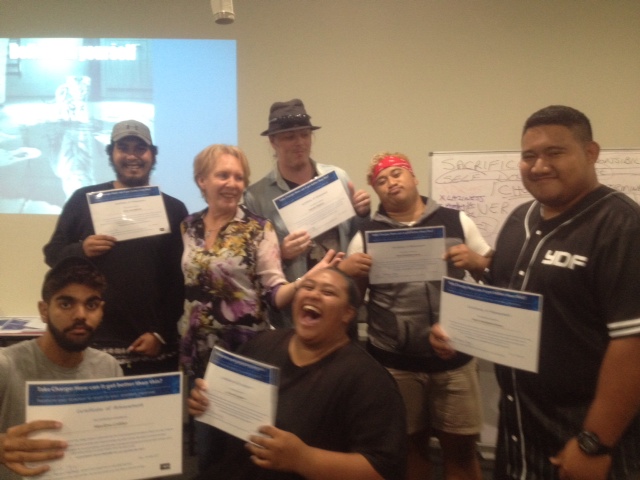
The participants
7 youths aged 15 to 23 participated in the program. Cultural backgrounds included Samoan, Aboriginal, European, and multicultural (Indigenous and European).
All participants came from low decile families and communities, and none were employed at the time of the program.
Most had very low, or no enthusiasm to look for work or be self-motivated in many ways, and some participants had very low learning, reading and writing abilities. None had ever completed a program such as Take Charge! and many had low self-esteem and self-confidence.
Why implement Take Charge?
I was referred to YDF by a member of an Australian government organisation who ‘connected the dots’ when she heard about Take Charge!
YDF were planning a one month ‘What’s Your Story’ program for their youth to learn about themselves and their cultures, and various skills to improve their lives and employment according to the objectives of YDF. Take Charge! was quickly recognised as an excellent fit to support the outcomes of that program
How did the Client and Take Charge! work together?
Several meetings and workshops were held with YDF and the stakeholders and organisers of ‘What’s Your Story’. We identified which modules of Take Charge! should be delivered. We designed how it needed to fit with other considerations involved.
Examples of some considerations included:
- cultural
- learning, reading and writing abilities (and disabilities)
- levels of participants disengagement and disadvantage
- other organisations and presenters
- subjects delivered in the complete ‘What’s Your Story’ program.
All Take Charge! modules were included in the design, except the Technology units.
Action quickly commenced to design:
- Lesson plans
- Goals books – workbooks for each participant
- Templates, presentation material, evaluation methodology and feedback forms.
Approval was obtained by the client prior to finalising all training tools, material and content, and the overall program design.
The required outcome
The successful outcome to be achieved was –
All participants to learn the importance of self-choice, self-responsibility, and self-direction, and be more self-motivated in future studies, work and their personal lives. These skills would support (and hopefully increase) their chances of self-employment, study results and level of self-satisfaction while providing them with more hope for a better future in the long term.
They would learn many skills in the program, some of which include:
- how to be empowered and better understand themselves, their goals and fears, take action and achieve success
- how to take charge of their own lives and choices
- how positive choices and taking action contributed to the success of themselves, their peers and others they make contact with
- how negative choices impact themselves and others around them
- their self confidence and self belief should also be increased.
The Delivery
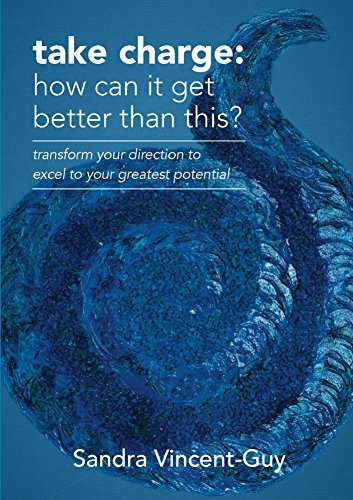
The program was delivered face to face in 3 x 2 hour sessions, in a group classroom environment at YDF premises. It was very interactive with workbooks completed by the participants during the program. Templates and workbooks were provided to each participant for use during the program and for their own goal reviews in the future. A copy of Take Charge: how can it get better than this? was also provided to each participant and referenced throughout the program.
I delivered Take Charge! by providing examples and outcomes of good and bad choices I had either experienced or learned from others. These examples and others were used throughout the program and as trust was quickly gained, the participants also shared examples from their own experiences and others they knew about.
Participants willingly contributed to whiteboard sessions and group discussions about many other subjects relevant to each module and the intended outcome, while having fun!
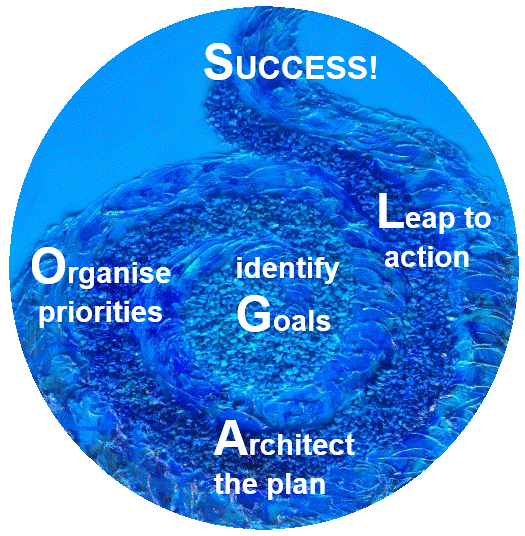
What is an example of what happened during the pilot?
One of the participants had spoken with a friend about their new-found hope, and they had made a date when their first international trip would commence. Fears of ‘what if something happens if I travel alone?’ were unrealised, as their friend had also decided to join the travels, so their peer was also positively empowered.
When this was shared with others in the class, they too shared in the excitement and felt more hope for themselves. The participant about to travel the world in the future also felt empowered that they were able to help their classmates with their own motivation, by sharing their positive choices, actions, and positive results.
Comments included: ‘If that can happen to one of us so quickly just by setting a goal and taking action, it can happen to me too!’
They were all very excited about their futures more than they had ever been in their lives. They realised it ‘didn’t have to stay the same as it had been so far’ and ‘if they just did the work needed they could have anything they wanted’. Signs of increased self-belief!
The Outcome
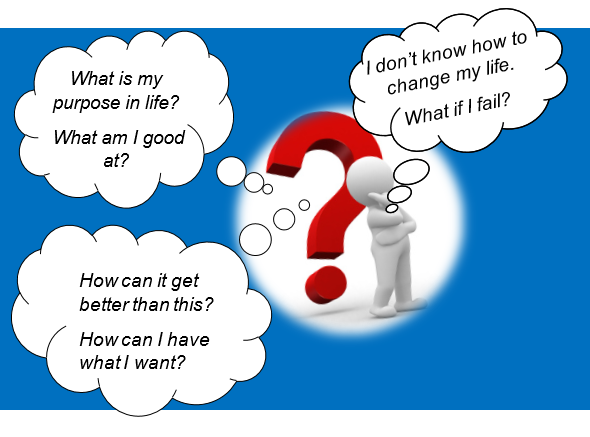
All participants completed the program with exceptional goals and were fully motivated and more hopeful about their future, regardless of their current disadvantages or past poor choices.
Examples of goals made were –
‘I am going to get off the couch and get a job so I can contribute to the house my family are paying for me to live in, and to the cost of my food they are giving me.’
‘My first goal is to save some money to buy some shoes so I can get a job which will pay for a better place for me to live in. Then I can have more goals for myself in the future’.
‘I want to open a dance studio and travel the world’.
‘I want to build my own house’.
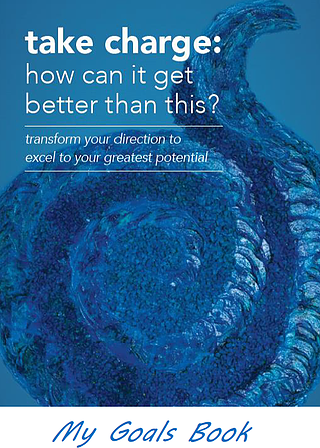
All participants realised that Fears were usually unrealised, and that FEAR really DOES mean False Evidence Appearing Real! They learned (and believed!) that if they break through and meet their fears head on, then do the work and get the right help and support working towards their goals, they CAN achieve anything they want!
All participants learned how to use all tools. And using their own copy of Take Charge: how can it get better than this, and the blank templates provided, they could review changes needed in their future to achieve goals without my help.
The wider community also benefited from the program with some participants making more positive choices than they had done in the past.
Some examples include:
- past experiences relating to crime and the consequences of their actions
- negative peer associations
- changed expectations from ‘others should give me what I need’ – to ‘I can work to get what I want and need’.
Many other successful outcomes were achieved. Please contact Sandy for more information.
The Evaluation
SUCCESS! What worked well
The program was a success in many ways. There are too many to list so please contact me for further details.
All desired outcomes were met including:
- Self belief and self confidence was increased.
- They were all extremely motivated and now had a real reason to make more efforts to get a job – their own goals were paramount as they could clearly identify that a job would not only provide them with money they needed. Additional motivation for having a job was they felt they would continue to feel good about finally achieving success in their lives. Where before the program they felt little hope about having a better life than they had to date and currently, and some were unmotivated to really look for work. Now they had a real reason – achieving success feels great!
- They all realised the importance of taking their own action to move forward, and they learnt HOW to do it.
- All participants understood where they could find post-program support (from YDF in the first instance and the Take Charge! book and templates on their own) so they could continue to move forward to a much more satisfying and positive life.
- To have a better understanding of their cultural and religious beliefs and themselves.
- To be able to relate well to the participants struggles and level of understanding, it was crucial to the successful delivery and outcome to workshop with the organisation to understand during the design phase:
- the organisation’s background and focus, other projects and organisations they work with
- all modules delivered by others in the full What’s Your Story program
- participants overview history, and their cultural and religious beliefs and requirements
- the disadvantages holding them back
- their learning, reading and writing abilities (and disabilities).
Feedback received
Evaluations were completed by all participants for both their level of understanding and the delivery of the program in general.
All feedback from all participants was excellent, as appropriate to their level of learning.
Comments received from participants when asked what they liked best about the program included:
Being able to learn about achieving goals and overcoming your fears.
It helped me make my goals and learn more about how to get them.
Helping me to plan my goals.
I like the program because I can get my goals. I loved every bit of this program!
Thank you Sandy for helping us with this. I’m so excited to see what the future holds for me!
Note: An additional session of ‘how to write your story’ was delivered remotely to support another module YDF had included in the full ‘What’s Your Story’ program, as a separate delivery from Take Charge! This session provided the class with the knowledge and processes they required (at their own level of learning and literacy) to write a brief story about their own upbringing, schooling, history, culture and other relevant factors they felt contributed to their own lives and choices, to date.
As this is a separate case study, please contact Sandy for more information.
Questions
Contact Sandy on 022 0844 024 or email:
- To chat about how Take Charge! would suit your own organisation and its people
- For more information about this case study
- To answer any other questions you may have.


